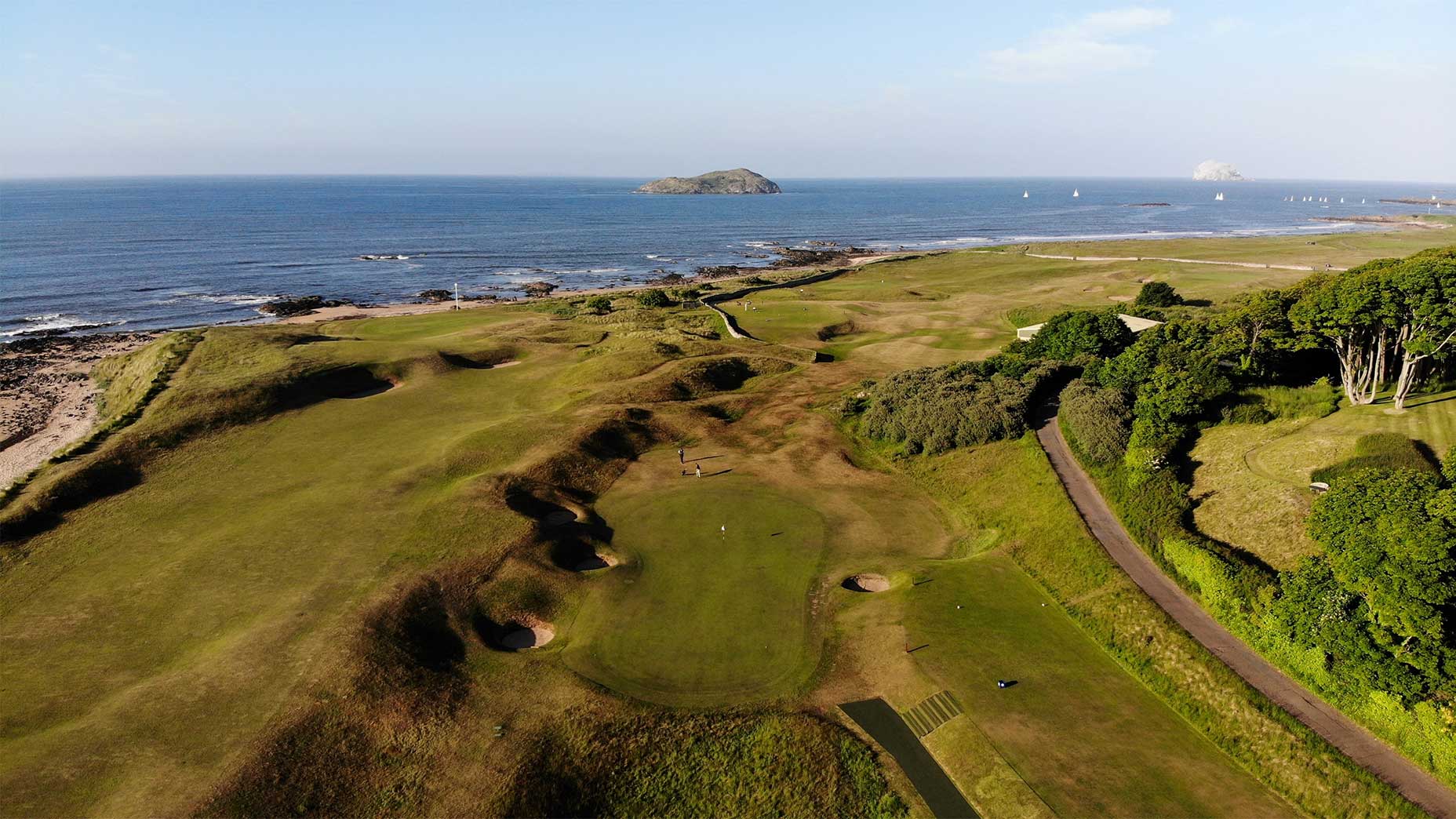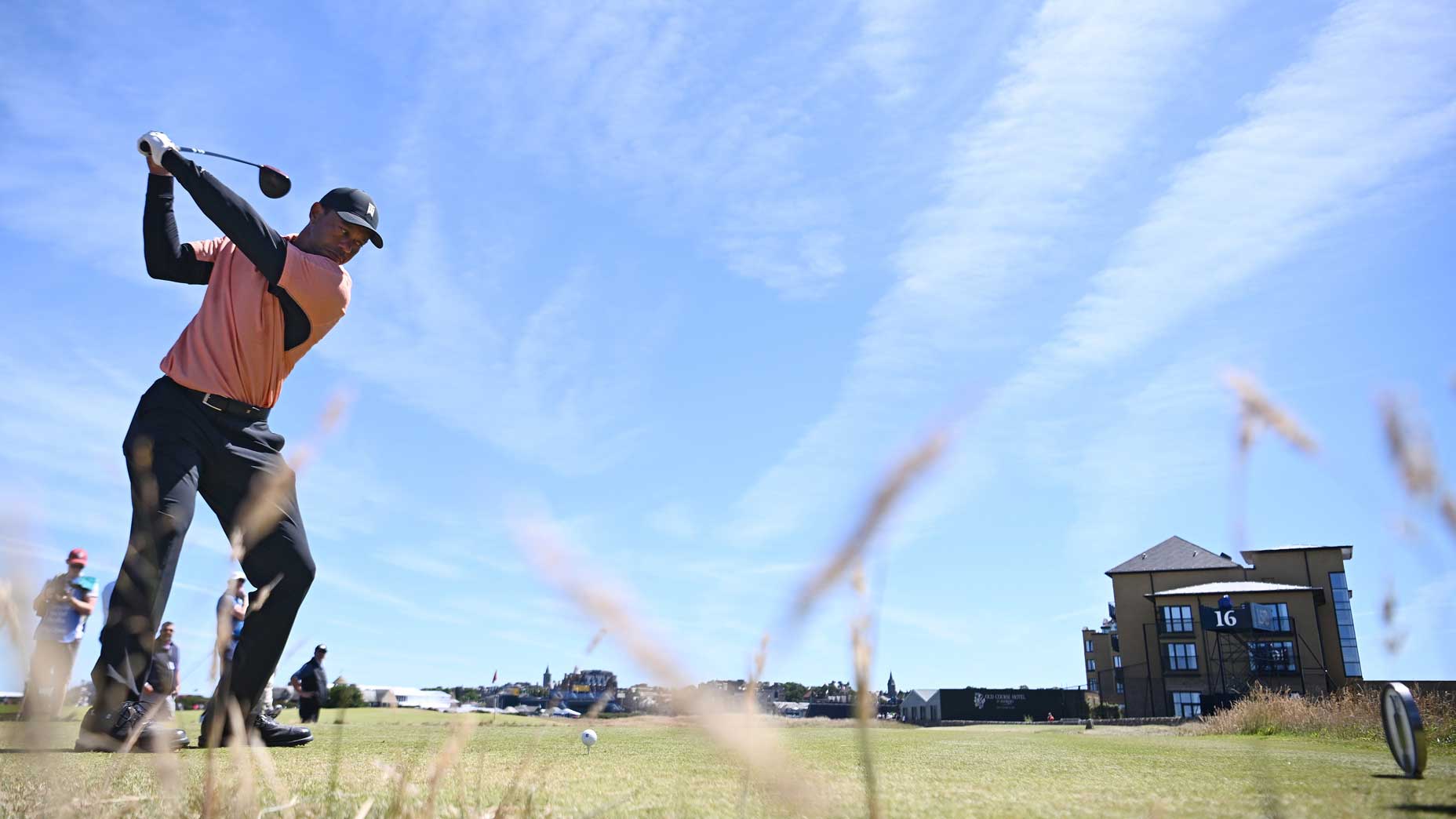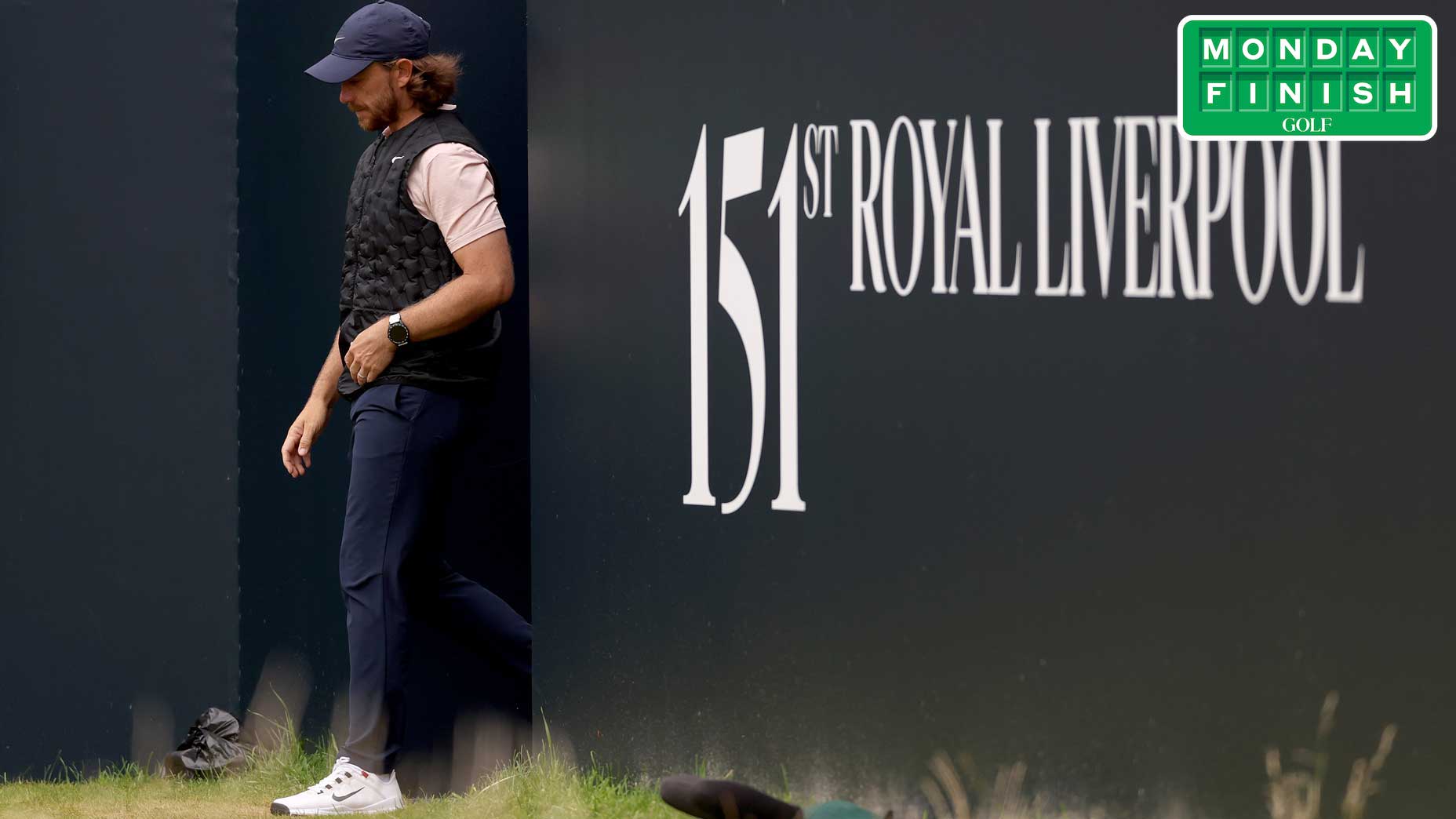1. The Open Championship, the year’s final major, is here, and there is no shortage of storylines. It’s the event’s 150th anniversary. Tiger is playing. So is Phil. And on and on. What are you most looking forward to playing out across the pond this week?
James Colgan, assistant editor (@jamescolgan26): I think the story of the week is Tiger Woods playing in what could very well be his final Open at St. Andrews as a serious competitor. The Old Course is Tiger’s favorite in the world. It’s flat enough for him to walk without issue. It’s the sort of place in which mental advantages are generally more significant than physical ones. It feels like Tiger’s whole year — and maybe longer — has been building toward this week. It’s hard to overstate the significance of this event for the most significant player in the history of the sport.
Sean Zak, senior editor (@Sean_Zak): I’m most looking forward to my coworkers arriving! But on a serious note, James is correct. Secondarily, I’ll look forward to Rory McIlroy’s opening 66 Thursday afternoon, followed by a 68 Friday morning.
3 weeks, 3 countries, 3 wins: Xander Schauffele shines at Genesis Scottish OpenBy: Dylan Dethier
Dylan Dethier, senior writer (@dylan_dethier): This is one week where the stakes set themselves. It’s the Open at St. Andrews! That’s the story! But if we’re diving into the details of this tournament itself I’m eager to see how Xander Schauffele, arguably the best golfer without a major, fares coming off a red-hot stretch that includes wins in two consecutive PGA Tour starts.
Josh Sens, senior writer (@joshsens): In the modern era, golfers who have done well at Augusta have tended to do the same at the Old Course. All of which is to say that it’s prolly not a bad idea to throw a few shekels on the likes of Scottie Scheffler, Cam Smith, Jordan Spieth and, yeah, probably Tiger, and see if recent history repeats.
2. Jordan Spieth, in an interview during the Scottish Open, was asked if he thought St. Andrews was “too easy,” to which he replied: “But I think if it’s like it was this morning out here, it’s just a wedge contest, really.” Spieth added as part of another answer that he didn’t think the major was in any way lessened, and that if the weather kicks up, the thought is moot. Does Spieth have a point: With modern technology, could a St. Andrews Open turn into a chipping contest?
Colgan: Absolutely. If the wind doesn’t blow, we could see a winner at-or-near 20-under. But does that lessen the scope of the event, or the golf course? Of course not. Everyone is competing in the same arena, under the same stakes, for the same prize. Is winning a ‘wedge contest’ any less valuable than winning an iron contest, like we saw at the U.S. Open? I think not.
Zak: It’s sort of what everyone doesn’t want to admit, right? Hopefully it will be windy, and then we can forget about it until the next Open. But if it’s not, we may have to just rip the band-aid off once and for all with a serious discussion of rolling back the ball. The Old Course, as a physical property, doesn’t have much more bend to it.
Dethier: We’re going to see a lot of wedges, for sure. We see quite a few every week! Low scores are all but assured; we’ve seen plenty at the Old Course during Dunhill week in recent years. This week will be a good test of how it stands up under reasonable weather conditions with major-championship preparations. I’m predicting a lot of red numbers, but a firm, fast St. Andrews will still be a delight, even if they go low.
Sens: It’s a bummer what modern equipment in the hands of the best players has done to a lot of classic courses, not just this one. Without some challenging weather, we’re not going to see the kind of demands that make the Open Championship so great when it’s at its best. In that sense, yeah. It can be too easy. But everything is relative. Someone is still going to have to go lower than everyone else, which is hard.
3. Tiger Woods and Phil Mickelson are playing their first major together since … the November Masters in 2020. Given their ages and the fact that the Open likely won’t be played at St. Andrews for at least another five years, Golf Channel’s Shane Bacon raised an interesting thought by suggesting that Woods and Mickelson be paired together. What do you think?
Colgan: The TV executive in me says hell yes, but the realist in me knows it won’t happen. The R&A is far too prideful to subject itself to what could become an extremely high-profile LIV sideshow.
Zak: Absolutely not interested. The R&A doesn’t do side-shows. Just ask Greg Norman. Pair Tiger up with Kurt Kitayama and Sam Burns.
Dethier: Nah. As James mentioned, we don’t know that we’ll see Woods back here with a chance to contend. He’s plenty of draw on his own. (Who am I kidding — he might well win here in 2027.)
Sens: The only way they get paired together is if their scores call for it after the cut.
4. The Scottish Open, won by Xander Schauffele, was the first co-sanctioned event between the PGA and DP World tours, with players from both sides also filling out the field at the Barbasol Championship, in Kentucky. Are you a fan of these co-sanctioned events, and are we likely to see more of this collaborative approach as LIV Golf continues to attract more players?
Colgan: If co-sanctioned events lead to a more consistent PGA Tour presence in the UK and Ireland, I’m ALL for it. It’s ridiculous to me that the Tour travels to TPC Deere Run every year, while courses like Muirfield, Carnoustie and Portrush go unseen for years on end. It’s time to bring links golf back to the Tour.
Zak: These co-sanctioned events are going to be vital to both tours. They should co-sanction the Irish Open next. And the BMW PGA Championship after that. If the alliance is as strong as Monahan and Pelley say it is, that would help prove it.
Dethier: Co-sanctioned events are inherently valuable in and of themselves. But if they can attract strong fields in interesting locales? I’m all the way in. Elevating the Scottish Open as a pre-Open links test was absolutely perfect. Only critique: I’d love to see it travel to some great linksy tests.
Sens: Agreed. Co-sanctioning matters if it gets as many of the top players as possible together in one place. And I do think we’ll see more. It wasn’t talked about much explicitly this week, but the subtext in a lot of the conversation (14 of the world top 15 are here!) made it all feel like alliance-building against an outside attack. There will be more.
5. Last week also saw a potential turn in feeling from Rory McIlroy regarding the LIV Golf threat, when, in an interview with the BBC, he said he believed that golf’s governing bodies ought to cooperate to find a solution. “I think at this point if people are wanting to spend that much money into golf, that’s wonderful. I just wish that we could have spent that much money within the structure that has existed for many decades in golf instead of being a big disruptor.” Do you see all parties — the PGA Tour, DP World Tour and LIV Golf — eventually coming to the table? Or has that ship sailed?
Colgan: The only table I can see the PGA Tour, DP World Tour and LIV Golf convening is in a courtroom.
Zak: Anything is possible, of course. But too much vitriol has passed between Norman and Monahan that I just can’t see it. Ship: sailed.
Dethier: It makes sense in theory, but I’m not sure either side currently has much incentive to cooperate. LIV is feeling powerful, but the PGA Tour still has all its existing machinery and little to gain from negotiating. Unless that changes, I’m not sure what there is to talk about. But I don’t think the golf world at large necessarily agrees with the three of us.
Sens: Is it really “wonderful” that people are willing to spend that much money on professional golf? It definitely changes things. But if you’re going to pour money into golf, other parts of the game could probably use it more. Just because LIV is now pumping billions into a professional tour doesn’t mean that it’s rational or merited.
Tiger, Phil … and a ‘wedge contest?’ This could be one wild Open weekBy: Nick Piastowski
Professional golfers were getting paid pretty well already. Is it tough to break in? Absolutely. Might you have to sleep in your car and fly coach and spend years battling against the odds? Sure. One of the reasons it’s extremely difficult is that the potential financial rewards are astronomical. You don’t like the tradeoff, choose a different career. There are plenty out there that are much tougher and pay a whole lot less. Now that I’m done digressing, to the question: imagine a world where LIV keeps drawing top talent and the Saudi circuit gets OWGR points, allowing everyone on LIV to continue getting huge guaranteed paydays while also still having a crack at the majors. If that came to pass, the Tour might very well need/want to sit down at the table. But would LIV want to negotiate at that point?
6. GOLF Magazine and GOLF.com just unveiled its first-ever Top 100 Courses in the UK and Ireland ranking with — surprise, surprise — the Old Course at St. Andrews headlining the list. But there’s no shortage of great golf across the pond. What’s your favorite UK or Ireland course you’ve ever played? (Or, if you haven’t made it there yet, what’s No. 1 on your wish list?)
Josh Berhow, managing editor (@Josh_Berhow): Portmarnock Golf Club. It was the one course I targeted when I visited Dublin a few years ago, and I was blown away by how much I enjoyed it and how playable it could be for an Average Joe like me. I knew it had great history and crowned iconic champions from when it hosted more pro tournaments, but the fun factor was off the charts. It had blind shots, fun (but potentially devastating) swales, and I even got to play a handful of holes in howling winds. That I’ll never forget.
Colgan: Just two weeks ago, I fell deeply and irrevocably in love with Scotland at the West Links at North Berwick. It was my first round in the old country, and the whole universe seemed to conspire to provide me — and my playing partners Sean and Simon — with a day we’d never forget. The cold, harsh weather I’d been told to expect broke just minutes before our tee time, and we spent the afternoon bathing in warm sunlight and a gentle breeze. In a word, the course is elusive — simultaneously easy and challenging, simple and complicated. It’s also gorgeous, snuggled cozily against the coast. Our day was perfect. The type that makes you feel fortunate to love golf, even if you don’t quite believe your eyes. After our round, a member overheard it was my first full day in Scotland, and turned to me with a chuckle. “You’re at a loss, aren’t you?” I still am.

Zak: I hate to take the easy route, but this week, I have to. No course stays in your brain longer after you’ve played it than the Old Course at St. Andrews. It just lingers. The 112 bunkers so perfectly warp your brain. The double greens give you something you’ve likely never seen before. The routing makes you worry about the wind at all times. It’s simple and damn-near perfect.
Dethier: Ardglass, a clever gem on the east coast of Northern Ireland. The clubhouse is a castle built in the 1400s. The course itself has the character to reflect that depth of history. Epic views around the rocky coastline yield the best sensation in golf: that you’re headed out for an adventure.
Sens: Cruden Bay in Scotland is my favorite. But since that’s high on a lot of lists, I’ll take the short skip down the coast to a sleepier spot: Royal Montrose. Many years ago, long before Donald Trump became president, I was interviewing him by phone about Trump Aberdeen, his new course in Scotland. It so happened I was on my way to Scotland for a travel story. Trump told me that if I wanted to play the course, I should absolutely, positively call him, because the place was so jammed, I would never be able to get on it otherwise. I would need his help. There was no other way. “Call me,” he said. “Or you’ll be out of luck.”
About a week later, I drove past Trump Aberdeen. The place looked sweet, for sure. As it happened, though, there were also plenty of open spots on the tee sheet. After getting over my shock that Trump had embellished the truth, I kept driving south, about 40 miles. I was following the advice of Donald Steel, a former top-flight amateur turned architect who has worked on or consulted with every course to hold an Open Championship. Steel had urged me to visit Royal Montrose. Despite its ‘royal’ designation, Montrose is an understated place, one that escapes the notice of a lot of golf nuts on a pilgrimage to Scotland. Steel said that people who missed it were committing an oversight. He was right.
Montrose sits along the coast in a town of the same name, a sneaky-great course that builds in drama as you go, rising and falling along the dunes. As with Trump Aberdeen, there were plenty of spots on the tee sheet when I got there. I walked right on, played alone, charmed by all of it. Afterwards, I grabbed a beer at a nearby pub. There was still daylight, so I walked over to Montrose and played again. I wouldn’t call Montrose Scotland’s greatest architectural marvel. But I can’t recommend it highly enough. Tons of linksy character. Not a whiff of pretension. And a reminder of just how many great spots there are to hit across the pond, even if you don’t have a powerful contact to get you a tee time at a big-name course.












